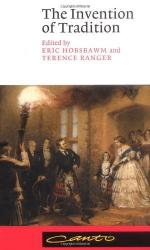
|
| Name: _________________________ | Period: ___________________ |
This test consists of 5 multiple choice questions, 5 short answer questions, and 10 short essay questions.
Multiple Choice Questions
1. As a reward for their loyalty to the British, several Indians were given all of the following titles except ______.
(a) Khelat.
(b) Raja.
(c) Rai Sahib.
(d) Nawab.
2. The author refers to all of the following grand ceremonies during the second period except _______.
(a) Victoria's Golden Jubilee.
(b) The funeral of George V.
(c) The coronation of George V.
(d) The funeral of Edward VII.
3. According to the book _____ is the term used for an offering of gold coins from a subordinate.
(a) Khan.
(b) Khelat.
(c) Peshkash.
(d) Nazar.
4. The aspects of ritual dance and performance to be studied include all of the following except ______.
(a) The self-image of the nation.
(b) The aesthetic sensibility of the people.
(c) Political power of the monarch.
(d) The attitude of the media.
5. According to the book, even ______ resistance movement could not initially dislodge the British.
(a) The Pope's.
(b) Mother Teresa's.
(c) Ghandi's.
(d) Mandela's.
Short Answer Questions
1. The book suggests that African politicians, nationalists, and ________ were left with ambiguous legacies.
2. During the third period, the royal rituals helped to comfort people during times of _______.
3. In the first period, the power that the monarchs wielded made grand ceremonies _______ as did royal unpopularity.
4. In 1857, the _______ cost the Mughal emperor authority and exposed the coercive basis of his power.
5. The author states that the last great ceremony in the third period was _________ coronation in 1953.
Short Essay Questions
1. What did Africa not have to offer as a society, which meant that they had to use a monarchy?
2. What are the ten aspects of ritual that David Cannadine says should be studied?
3. What did the committee, headed by Thomas Thornton, seek to replace in India?
4. How did many see the cultural integration when the British were occupying India?
5. Into what had the British turned themselves when they gave their monarch sovereignty over to India?
6. What was the first stage of the British monarchy that occurred between the 1820s and the 1870s, according to the book.?
7. How was the ceremony that incorporated India into Britain used?
8. What did African chiefs stand to gain from using the neo-traditions being taught to them?
9. What happened as a result of the African empires coming so late, according to the book?
10. What does the book say is dynamic and can change meanings even if the words never change?
|
This section contains 671 words (approx. 3 pages at 300 words per page) |

|




